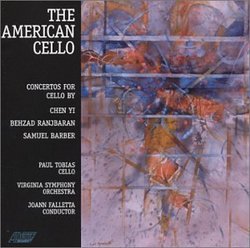Three Terrific American Cello Concerti, Superbly Played
J Scott Morrison | Middlebury VT, USA | 05/06/2004
(5 out of 5 stars)
"Paul Tobias is one of our best cellists, JoAnn Falletta one of our best conductors, and the Virginia Symphony, on the basis of this CD as well as a recent one featuring music of John Powell, lead me to believe that it is a near-the-top American orchestra. Add to that the three disparate but equally fine cello concerti by Samuel Barber, Chen Yi and Behzad Ranjbaran, and you have the makings of a terrific disc. And that's what it is, for sure. I was entranced from start to finish. The Barber Cello Concerto is probably the least played of his 'Big Three' concerti, the others being the Piano Concerto made so familiar by John Browning's championing it all over the world, and the Violin Concerto which is fairly frequently performed. I've never heard the Cello Concerto in concert, but for many years I've owned the recording made by a favorite cellist of mine, Zara Nelsova, with an orchestra conducted by the composer himself. But it's an old recording and its age is showing. There are recordings featuring cellists Ralph Kirshbaum, Wendy Warner and the ubiquitous Yo-Yo Ma (with David Zinman accompanying) but I don't know any of them. Tobias, though, certainly makes a wonderful case for this arch-romantic concerto, nurturing the long lyrical lines, particularly in the delicious Andante sostenuto second movement, and putting forth the dramatic moments in both outer movements with passion and technical skill in equal measure. I've listened to this performance half a dozen times now and it has not palled.Chen Yi (b. 1953) is a composer well-known to me from her tenure as professor of composition at our local conservatory. She certainly has caught the attention of others, too, having won the coveted Charles Ives Living Award from the American Academy of Arts and Letters for the period 2001-2004. This three-year award carries with it an annual stipend of $75,000 with the stipulation that the winner devote him/herself to composition only during the time period of the award. Her cello concerto, subtitled 'Eleanor's Gift' was inspired by Eleanor Roosevelt's efforts, at the time of the founding of the United Nations, to gain passage of the Universal Declaration of Human Rights. This piece celebrates the fiftieth anniversary of that document's acceptance by the signatories to the UN charter. Chen Yi has a special feeling for this effort since she was a victim during the notorious 'Cultural Revolution' in her native China. The concerto was written for Paul Tobias who premièred it in 1999. The most 'modern' of the three concerti here, it starts with the cello playing an anguished passage high up in its range, sobbing quietly at first and becoming more wide-ranging and passionate as it continues. There are two main themes, described thus by Chen Yi: 'a series of wide expressive leaps, moving angularly up and down in alternation, and a very restrained motive that suggests patient and gradual striving.' These are very easy to pick out when they recur even when they are combined and transformed. Throughout its fifteen minute length the music struggles and perseveres until ultimately a brighter atmosphere wins out, suggesting an optimistic resolution to the struggle, a fitting sonic depiction of the efforts towards human rights. This is a strong and dramatic work and I would hope that it is taken up by other cellists and conductors.The third concerto here is that of Iranian native, Behzad Ranjbaran, long resident in the US and a member of the Juilliard faculty. In its original form there was a narration that used texts from the writings of Thomas Jefferson. In this recording an alternate version for cello and orchestra alone is presented. It certainly stands on its own very well. In three movements, with several alternations of slow and fast passages, this is a Romantic concerto that at times reminds me of Bloch's 'Schelomo,' probably because, like the Bloch, it includes melismatic thematic material that sounds Middle Eastern. The 16-minute first movement is bold and heroic in effect. It contains virtuosic writing for the cello with use of double stops, trills, arpeggios and extended passages for cello alone. The six-minute second movement is melancholy and haunting (and indeed a version for cello and piano is published separately with the title 'Elegy'); its melodic materials are lusciously romantic. I'm a goner for this kind of writing for cello and orchestra and have to admit that I have listened to it separately probably half a dozen times because it is so memorably melodic. Tobias's cello sings like a mezzo-soprano with undending breath control. Glorious! The third movement, Allegro vivace, is a six-minute romp that reminds us of the heroics of the first movement but moves on to unbridled celebration and features an infectious dotted-rhythm tune that will stick in your mind long after the piece is over. This is one terrific concerto, folks!This issue is a triumph from throughout its 72 minute length. I recommend it highly. My only problem with it is that I keep playing it over and over again and this keeps me from listening to several other new CDs that have had to remain in their shrink-wrap.Scott Morrison"


 Track Listings (7) - Disc #1
Track Listings (7) - Disc #1